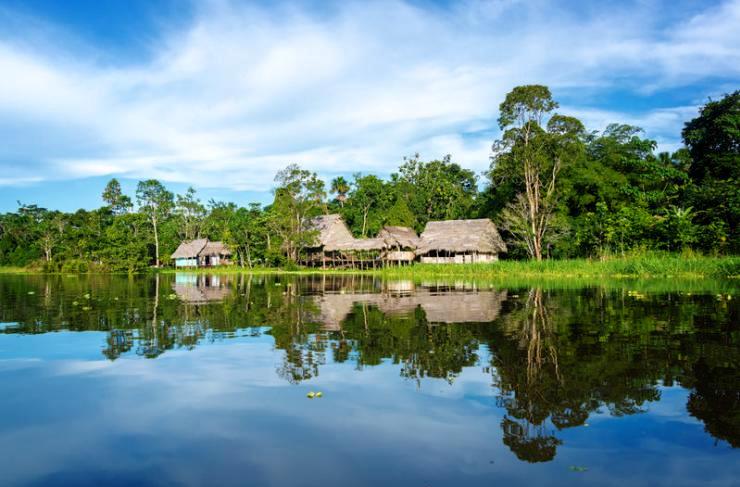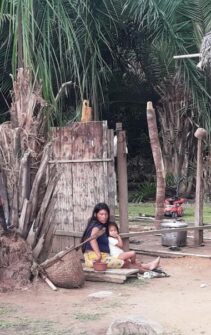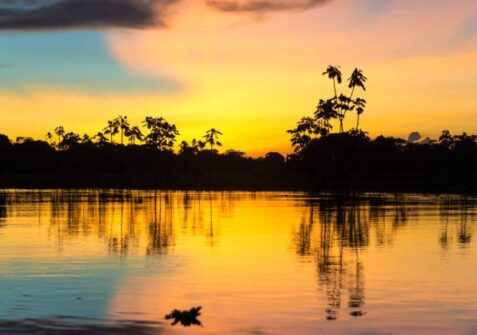Peru. Birth among the Asheninka. An Offer to the Big River.

The Asheninka live in the central forest of the Ucayali district in the Atalaya province, in eastern Peru. Their culture is characterised by their coexistence with nature where life develops in its integrity. The sorala, the Asheninka’s birth rites.
The Asheninka future mothers follow a special diet during pregnancy. They do not eat some foods which are believed to be dangerous for the baby, such as turtle meat, which according to the Asheninka could be responsible for some kinds of deformities, or other foods that could affect the duration of delivery.
The gestation period is calculated according to the phases of the moon. During this period, the future mother and father prepare for the baby’s arrival, and make sure they have all the essential things a newborn baby needs, such as clothes, or the aparina (garment to carry the newborn baby). All family members are very attentive to the symptoms and signs regarding the pregnancy of the future mother. If the pregnant woman is away from her family or community, for work or other reasons, a month before the delivery she comes back to her husband’s house where she can feel safer and supported by her relatives.

Besides, there are no hospitals where women can have their labour and delivery in the Amazon region, therefore pregnant women can just get the help of their relatives, especially of their husbands and mothers. That is why pregnant women in the Amazon region have to be very attentive to recognise the signs of labour and immediately inform the relatives living with them, so that they can prepare everything for the delivery.
As soon as a pregnant woman realises that the labour may be starting, she informs her husband and her mother; they call one of their neighbours with experience in childbirth, or a midwife, to help the future mother to deliver her baby. When the labour pains begin, the future mother holds onto a trunk or a branch of a tree.
That will help her during the expulsion stage. The pregnant woman waits, sitting crouched on a mat until the moment of delivery. After the child is born, the midwife uses cotton tape to clamp the umbilical cord and then cuts it with a reed or bamboo leaf.

Soon after delivery, newborn babies are bathed in warm water into which some aromatic and medicinal herbs have been poured.
Then babies are dried and wrapped in a cotton towel and laid down next to their mother, so that the skin-to-skin contact continues and improves the attachment between the mother and the newborn.
The offering of the placenta to the land or to the big river represents the second important moment of the birth ritual. If it is decided to offer the placenta to Mother Earth, the new mother and her family look for a suitable place where the placenta is buried as an offering to Mother Earth, so that the newborn baby can receive the welcome, the blessing, and the fruits and goods that Mother Nature can offer. Or else the baby’s family can decide to offer the placenta to Yaku Mama, ‘Mother of the Waters’, which is one of the three ancient snake mothers of the Peruvian Amazon, and which is represented as an anaconda that, when happy, blesses people with plentiful rain and abundant fish.

123rf.com
The river is essential to the life of this indigenous population, because it is a means of transportation and communication between different communities and provides fish which is one of the staple foods among these communities. The placenta is offered to the river also to get protection for the baby from accidents when navigating the river. At the end of the ritual, the midwife gives some advice to the new parents, who should not leave their home and even less their community until the baby’s navel dries up, in order to avoid infections. The parents thank the midwife, who has finished her work, and assure her that they will always be willing to help her with whatever she might need in order to show her their gratefulness. Then in the following days after the big event, family life gradually returns to normal. (Photo: 123rf.com)
Jhonny Mancilla Pérez



